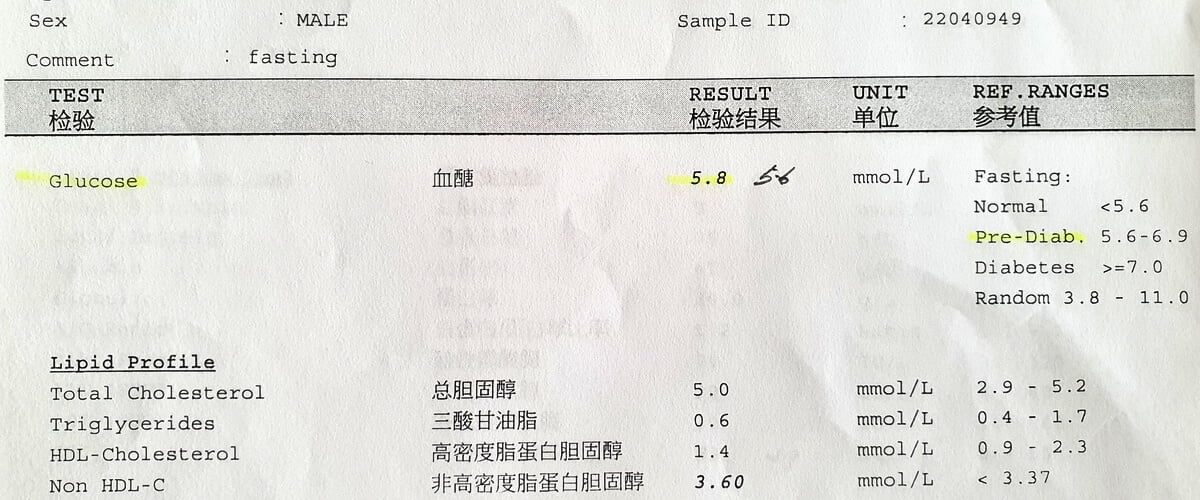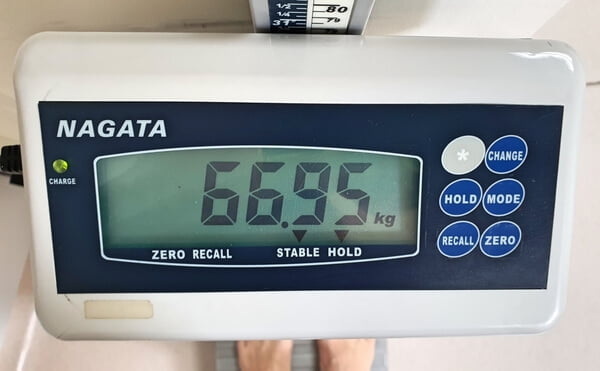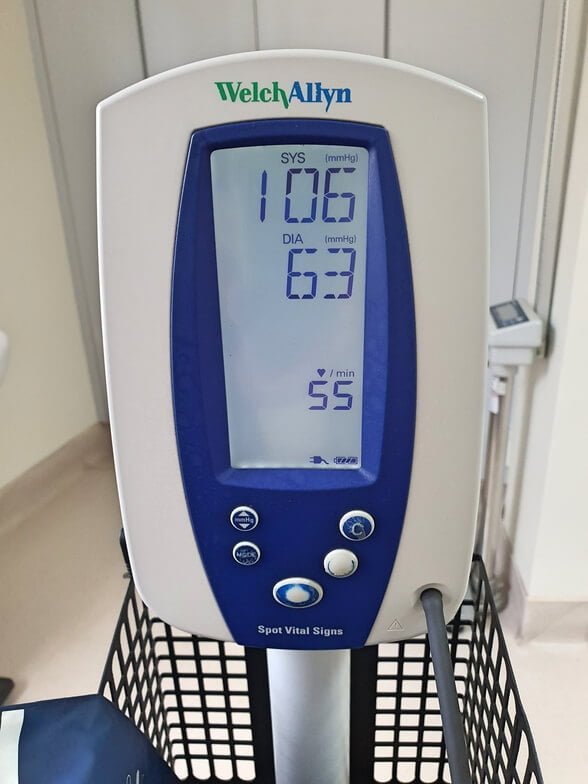Gastroenterology Appointment on March 29, 2022 – High Fasting Blood Sugar Level Despite Healthy Lifestyle and Weight Loss
My ulcerative colitis remains in clinical and biochemical remission. Despite regular exercise, a healthy and modest diet, and shedding 850 grams of body weight, my fasting blood glucose level was higher than that six months earlier.

I saw my gastroenterologist on a scheduled appointment on March 29, 2022.
No Bowel or Other Symptoms
I had been feeling fine, and my energy levels were good. I had no symptoms to report.
My bowel movements were regular, once daily, like clockwork. I didn’t notice any blood or mucus in my stool, and its consistency was normal.
Weight Loss
I weighed 66.95 kg – this was 850 grams less than my previous measurement (67.8 kg), almost six months earlier (October 5, 2021).

In the three months leading up to my appointment on March 29, my exercise had comprised either stair climbing or walking. Each session usually lasted about an hour but occasionally much longer.
I had not rowed, cycled, or run to avoid aggravating left-sided sciatic symptoms. Because of the low intensity of stair climbing and walking, I stair climbed or walked on more consecutive days before taking a rest day, compared to rowing, cycling, or running. To some extent, the greater frequency of exercise made up for the lack of intensity.
There had been no significant changes to my diet for over nine months.
Because I had stayed off cycling and rowing the past few months, I believe some of my weight loss was because of loss of muscle mass and not body fat reduction only.
Blood Pressure and Heart Rate
My blood pressure is usually slightly elevated, around 145–155/85–95 mmHg, when I am at the hospital.
However, to my surprise, my blood pressure, as measured by the sphygmomanometer at the gastroenterology clinic on March 29, was 106/63 mmHg.
My heart rate was 55 beats/minute, which was a little high for me – my resting heart rate is usually 45–50 beats/minute.

Blood Tests
As was usual on the days of my appointments, I had blood tests done in the morning before seeing the doctor in his consulting room.
Elevated Fasting Blood Glucose
Among all the blood tests, the one I was most interested in was my fasting blood glucose.
My fasting blood glucose level on my previous two visits, i.e., on July 6 and October 5, 2021, was 5.6 mmol/L, or 100 mg/dL. With the exercise I had been doing, the diet I was on, and the weight loss of 850 grams I had achieved during the six-month interval between clinic visits, I had expected my blood glucose level to be lower than 5.6 mmol/L.
So, when my gastroenterologist told me my fasting glucose level was 5.8 mmol/L, I was more than taken by surprise.
I was both astonished and disappointed by the result. It was akin to doing everything right for an exam, expecting to score an A grade, and getting a C instead.
My instant reaction was, “I can’t believe it!”
There was no reason for my glucose level to have been the same, let alone higher.
The only risk factors for diabetes I can identify are:
- Age – I am over 45 years of age;
- Family history of Type 2 diabetes – my father has Type 2 diabetes; and
- Southeast Asia descent.
I am not overweight (my body mass index is 22.6), exercise almost every day and consume what most consider a healthy, and modest diet.
Because of a slightly elevated gamma-glutamyl transferase (GGT), my gastroenterologist suggested I might have non-alcoholic fatty liver disease. He ordered another ultrasound scan of my abdomen on the day of my next appointment.
However, I believe there was a more straightforward explanation for the raised blood glucose level. I will discuss this issue in my next blog post.
High Non-HDL Cholesterol
My non-HDL cholesterol level was a tad high at 3.6 mmol/L (laboratory reference range: <3.37). The rest of my lipid profile was normal.
Raised Uric Acid
My uric acid level was high (again) – 459 μmol/L (laboratory reference range: 142–416). Six months earlier, my uric acid was 440 μmol/L. My uric acid has been above the normal range for over 17 years. Hence, the result on March 29 did not surprise to me.
There is no apparent cause for my high uric acid level. I have not drunk alcohol since diagnosed with ulcerative colitis about four years ago. My diet is not rich in purines, and I’m not taking any drugs that may cause hyperuricemia.
The other parameters of the renal function test were within normal limits.
Slightly High Gamma-Glutamyl Transferase
My gamma-glutamyl transferase (GGT) level on March 29 was 53 IU/L, slightly above the laboratory reference range (0–50). My GGT was 29 IU/L on October 5, 2021. The other parameters of my liver function test were normal.
Normal Full Blood Count
Blood counts were within normal limits.
Normal Erythrocyte Sedimentation Rate and C-Reactive Protein
My erythrocyte sedimentation rate (ESR) and C-reactive protein (CRP) – inflammatory markers – were both normal.
Normal Urine Analysis
Analysis of my urine did not find any abnormality.
Conclusion
Putting it all together:
- My ulcerative colitis remains in clinical and biochemical remission.
- I had lost 850 grams of body weight in six months through regular exercise and limiting my calorie and carbohydrate intake.
- My fasting blood glucose level (5.8 mmol/L) was higher than the two previous measurements (both 5.6 mmol/L) six and nine months earlier, despite the regular physical activity, a healthy and unchanged diet, and shedding 850 grams in about six months.
- My uric acid level was above the normal range – this has been a long-standing problem but not one I have been concerned about.